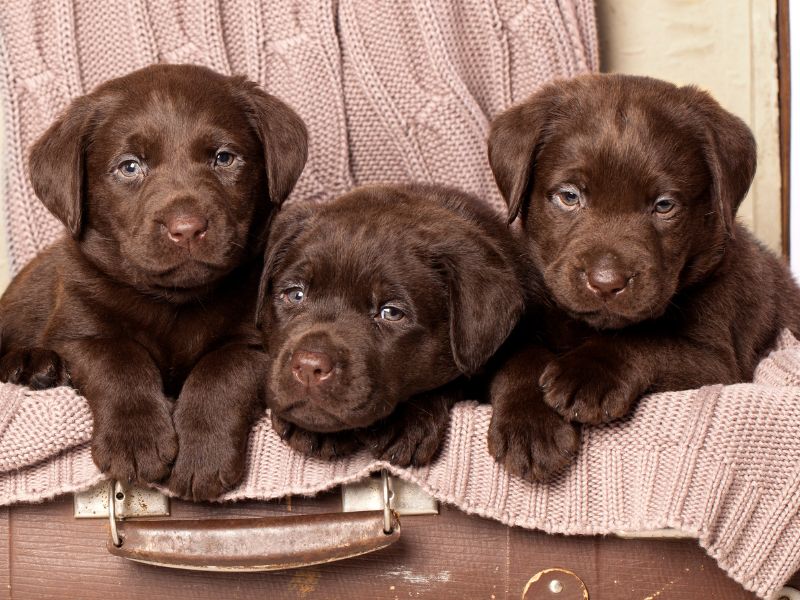
Prospective dog owners looking to add a new Labrador puppy to their family should carefully research and choose a reputable breeder. Unfortunately, not all breeders have the best interests of their puppies in mind, and some may prioritize profit over the health and happiness of their animals. This article provides guidance on how to identify a problematic Labrador breeder and avoid potential issues. A major warning sign of a bad breeder is a lack of concern for the puppies they are producing. Unscrupulous breeders are often focused on making money quickly rather than ensuring the well-being of their animals. They may neglect essential health tests for the parent dogs or fail to provide proper care for the puppies, leading to potential health issues and behavioral problems down the line. Another red flag to watch out for is a breeder who shows no interest in learning about potential buyers and their living situation. A reputable breeder will want to ensure that their puppies are going to loving homes where they will be well cared for. If a breeder doesn’t ask questions about the buyer’s lifestyle or living environment, it could indicate that they are more interested in making a sale than ensuring the welfare of their puppies.
A reliable Labrador breeder is essential when looking for a new furry family member. Sadly, there are unethical breeders who prioritize profit over the well-being of their puppies. Here are some warning signs to watch out for: A good breeder will take an interest in your lifestyle and experience with dogs, as well as why you want a Labrador. If the breeder doesn’t ask you any questions, beware. Responsible breeders conduct health tests on their parent dogs to prevent passing on genetic health issues. If the breeder hasn’t done this, it’s a troubling sign. Documentation of health tests is crucial. If the breeder can’t provide evidence of these tests, they might not have actually done them. A reputable breeder will have a purpose for their dogs beyond breeding, such as showing or hunting. If the dogs only serve to produce puppies, it could be a red flag. Beware of breeders who have multiple litters in a year. This could indicate they are running a puppy mill. Be sure to choose a breeder who genuinely cares about the health and well-being of their dogs and puppies.

A reputable breeder will ensure that the puppies have a clean and comfortable environment that is suitable for their needs. If the puppies are kept in inadequate surroundings, it may indicate that the breeder is not prioritizing the well-being of the puppies.

Responsible breeders prioritize providing puppies with a clean and comfortable environment that meets their needs. If puppies are kept in unsanitary or cramped conditions, it indicates inadequate care from the breeder. A reputable breeder will allow you to visit their home to see where the puppies are raised. Refusal to permit visits could be a red flag for operating a puppy mill. Quality breeders ensure their puppies have toys and soft bedding for play and rest. Absence of these items suggests the breeder is not meeting the puppies’ needs adequately. A healthy weight for puppies is crucial, and responsible breeders make sure their puppies are neither underweight nor overweight. Extreme weight issues could indicate neglect from the breeder. A good breeder is transparent about the stud dog used for breeding and willingly shares information about him. If a breeder is reluctant to disclose such details, there may be something suspicious going on. It is important to note if the mother of the puppies is familiar with her name, as it can indicate the level of care and attention she receives from the breeder.

A responsible breeder will make sure their parent dogs are well-trained and socialized. If the mother dog doesn’t respond to commands or know her name, it could mean the breeder isn’t giving her proper care. A reputable breeder will gladly provide information about their vet and the care their puppies have received. If a breeder refuses to share this information, it could be a red flag that they are hiding something. Looking to buy a Labrador puppy? It’s essential to find a trustworthy breeder. Pippa’s training tips can help you spot warning signs of a bad breeder and avoid making a purchase from them. KC registration papers are crucial for proving a dog’s pedigree and ensuring they come from a reputable breeder. If a breeder claims their dogs are KC registered but can’t show you the papers, it’s a cause for concern. When a breeder registers their dogs with a different agency than the Kennel Club, it may indicate they are not reputable. The Kennel Club is the primary registration agency for purebred dogs in the UK. If a breeder suggests that KC registration is a guarantee of a dog’s health, be wary. Registration is not an indicator of a dog’s health, and breeders should not imply that it is.

A responsible breeder should avoid using shy or aggressive dogs in their breeding program, as these traits can be passed down to the puppies. If the breeder does not prioritize good temperaments in their breeding stock, it’s a major concern.

A breeder who does not have a job other than breeding may not be putting enough time and effort into properly caring for their dogs and puppies. It could be a red flag if the breeder does not have a stable source of income outside of breeding.

A responsible breeder should have multiple streams of income and not depend solely on breeding dogs for a living. It is a cause for concern if the breeder does not have any other source of income besides breeding. Labrador Retrievers are widely known for their friendly nature and loyalty, making them one of the most popular dog breeds globally. If you are thinking about adding a Labrador puppy to your family, it is crucial to find a trustworthy breeder. Unfortunately, not all breeders have the wellbeing of their puppies in mind. This article will help you identify signs of a bad Labrador breeder and avoid potential issues in the future. When evaluating a breeder, one should consider their experience and knowledge level. A reputable breeder should be well-informed about the breed’s history, temperament, and health concerns. They should be able to answer any questions you have regarding the puppies they are selling. If a breeder seems disinterested or lacks knowledge, it could be a warning sign. Furthermore, the health of the puppies and their parents is a critical factor to consider. A trustworthy breeder will conduct health checks on their breeding dogs to ensure they are free from genetic diseases. They should also provide documentation of these tests. If a breeder cannot produce health records or is hesitant to discuss their dogs’ health, it may indicate unreliability. Another red flag to watch out for is if the breeder feeds the puppies low-quality or inappropriate dog food. Proper nutrition is essential for the growth and development of puppies. Feeding them subpar food can lead to various health issues and stunt their growth. A reputable breeder will provide information about the puppy’s diet, including the brand and ingredients used. If the breeder fails to offer this information or feeds the puppies inadequate food, it may be a sign to look elsewhere. In addition, a good breeder understands the importance of socializing puppies at an early age. Socialization plays a crucial role in a puppy’s development and behavior. Puppies should be exposed to various stimuli and interactions with different people to ensure they grow up to be well-adjusted adults. If a breeder neglects to socialize the puppies, it could lead to behavioral problems later on. Lastly, a reputable breeder should offer aftercare support to ensure the puppies’ well-being even after they have been adopted. This includes providing guidance on caring for the puppy and addressing any concerns or issues that may arise. Look for a breeder who prioritizes the health and happiness of their puppies throughout their lives.

When searching for a reputable Labrador breeder, it is crucial to consider the level of after-care they provide. A responsible breeder will offer ongoing support and guidance to new puppy owners, including tips on training, nutrition, and health. If a breeder does not offer after-care, it may indicate that they are more concerned with making a quick sale rather than ensuring the well-being of their puppies. Asking about a breeder’s after-care policies and support system is essential before making a decision. Some breeders may provide a limited guarantee or warranty for their puppies, which can be beneficial in case of health issues. However, it is important to carefully review the terms and conditions of the guarantee before purchasing a puppy. In addition to after-care, a good breeder should be accessible to address any questions or concerns from new owners, offer references, and allow visits to their facility to meet the puppies and parents. A breeder who neglects after-care may not prioritize the welfare of their puppies. It is crucial to seek out a breeder who is dedicated to providing lifelong support and guidance for their puppies. Dog Breeders who are not interested in staying in touch with new owners may be more concerned with profit than the well-being of the puppies they breed. Choosing a breeder who values transparency and communication about their breeding stock’s health and temperament is essential for ensuring a positive experience for both the new owner and the puppy.


